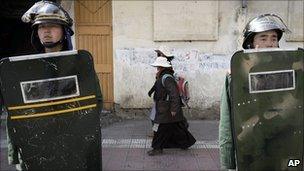China accused of excessive force over Tibet unrest
- Published

Human Rights Watch says security forces used excessive force to end the March protests
Chinese security forces used both brutal beatings and lethal force against protesters during unrest in Tibet in 2008, a rights group says.
Many of the protesters who were subsequently detained were beaten and tortured, Human Rights Watch said.
The report from the US-based group was based on interviews with 203 Tibetan refugees outside China.
China has blamed Tibetan "separatists" for inciting the violence and denies that excessive force was used.
The unrest in March 2008 was the worst in Tibet for 20 years. Violence erupted in Lhasa on 14 March, shortly after the anniversary of a failed revolt against China in 1959.
China says rioters killed at least 19 people, most of them Han Chinese, but Tibetan exiles say security forces killed dozens of protesters. The violence then spread to ethnic Tibetan areas outside Tibet.
In the wake of the unrest Tibet was closed to foreigners and tens of thousands of Chinese soldiers sent to the region.
'Indiscriminate shooting'
In its report, Human Rights Watch cited four occasions in which security forces open fired on demonstrators - in Lhasa on 14 March, and in three ethnic Tibetan areas in Sichuan province in the days that followed the Lhasa unrest.
The group also included testimony from protesters in Lhasa and elsewhere who said they saw people being beaten with electric batons and rifle butts, or kicked by police.
Tibetan protester Pema Lhakyi told the group she was near Barkor Square in Lhasa on 14 March.
"The soldiers did not come until afternoon that day. We could shout and protest as much as we wanted. It felt good," she said.
"When the soldiers showed up later, they threw tear gas. A gas canister hit my leg and I couldn't walk any more. Then there was indiscriminate shooting and we saw two people shot dead in front of us."
Sophie Richardson, HRW's Asia advocacy director, said that testimony from dozens of eyewitnesses showed "the official willingness to use lethal force against unarmed protesters".
"This report decisively refutes the Chinese government's claim that it handled the protests in line with international standards and domestic laws," she said.
Those who were arrested said they were beaten with clubs and sticks, held in cells so crowded they could not sit down and deprived of food.
Some said they had been told to admit they had been paid to protest by the exiled Tibetan spiritual leader, the Dalai Lama.
HRW said it had condemned violence committed by Tibetans as well as by security personnel.
But it called for an international investigation into the events of March 2008 and for Tibet to be opened to international media and monitors.
Responding to the report, Chinese Foreign Ministry spokesman Qin Gang accused Human Rights Watch of bias.
He described the unrest in Lhasa as "serious, violent criminal incidents that caused great loss to the lives and property of the local people", and said law had been enforced in a legal way.
- Published16 July 2010
- Published15 July 2010
- Published3 July 2010
- Published25 June 2010